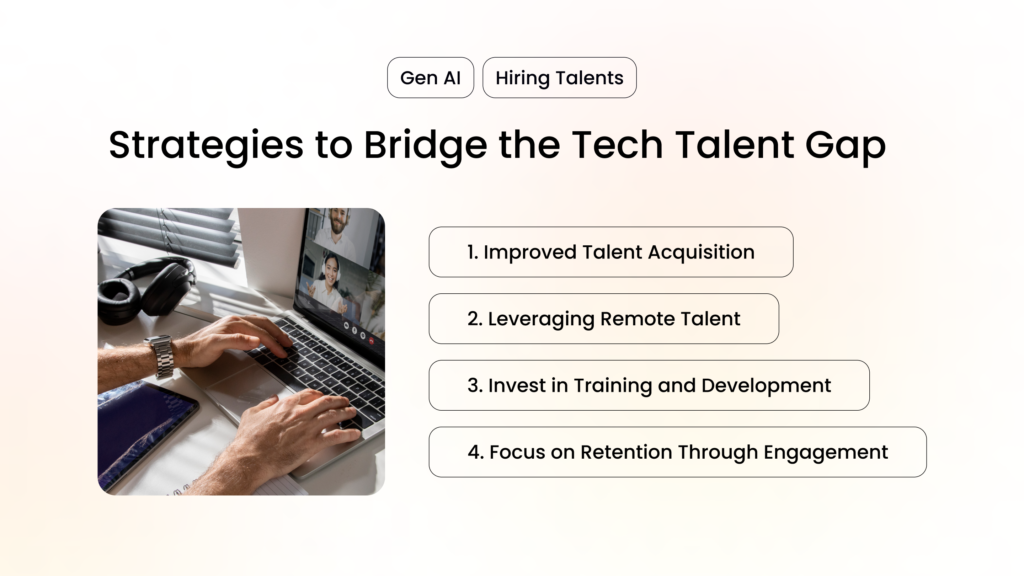In the vibrant world of startups, where innovation and agility are the names of the game, the challenge of finding and retaining skilled tech professionals is increasingly becoming a pivotal concern.
New businesses are increasingly producing tech tech-enabled products in the 21st century. Today, there are approximately 150 million startups worldwide, meaning highly skilled tech professionals are sought after by just about everyone.
Furthermore, LinkedIn reported that approximately 25% of startups talents are planning to switch jobs this year, so even if you startup manages to grab a hold of them, keeping them happy is just as much of an uphill task.
Here’s what startups need to know about hiring and retaining tech talents in 2024.
The Current Hiring Landscape
A talent shortage in the tech sector demonstrates the significant gap between the demand for skilled IT professionals and the available pool of such talent. This discrepancy arises when companies struggle to hire tech talents to fill their emergent needs, leading to unfilled positions and a lack of specialized expertise. It could be that startups fail to attract the right talents, or that there are less qualified candidates available than are in demand in the market.
Forbes has gone so far as to label this disparity an “existential crisis” for businesses reliant on continual innovation for growth and competitiveness. Last year, Udacity conducted a survey and found that 59% of 2000 employees reported not having sufficient skilled employees has “a major or moderate impact” on their businesses. Startups are destined to struggle without the right talent to enable their growth.
Impact of Tech Talents Shortage on Startups
The most sought-after tech talents in areas like AI, data science, and cybersecurity are proving to be elusive, posing a substantial threat to startups’ growth and innovation. The shortage places immense pressure on existing staff, leading to increased incidents of burnout and affecting overall productivity. Financial strains also emerge as businesses compete in a fiercely competitive talent market, often paying premiums to secure necessary skills.
The US Labor Department forecasts that by 2030, the global shortage of software engineers might reach 85.2 million, risking unfilled roles and potentially resulting in up to $8.4 trillion in lost revenue worldwide. This is not a distant future problem but an escalating issue that startups need to address now.
Strategies to Bridge the Tech Talent Gap
Facing such daunting prospects, what can startups do to mitigate the effects of this tech talent drought? Here are practical strategies that can pave the way for successful talent acquisition and retention:

1. Improved Talent Acquisition
Startups need to adopt a more strategic approach to their hiring practices. This includes not only identifying the right talent through a rigorous selection process but also effectively showcasing the unique opportunities and benefits that come with working in a dynamic startup environment. By being transparent about career advancement opportunities, fostering a culture of innovation and inclusion, and highlighting the chance to work on cutting-edge projects, startups can significantly differentiate themselves in a crowded market.
Additionally, emphasizing the potential for personal and professional growth within the company can attract top candidates who are looking for more than just a job but a place where they can make a real impact.
2. Leveraging Remote Talent
The pandemic has dramatically shifted perceptions regarding remote work, proving that productivity can be maintained or even enhanced outside traditional office settings. By tapping into global talent pools, startups can overcome local skill shortages and access top-notch professionals from around the world.
Global talent hub allows you to scale your workforce up and down on demand, keeping costs to a minimum, leveraging a wide range of niche IT and tech skills who are not interested in traditional employment.
3. Invest in Training and Development
Creating an ecosystem that promotes continuous learning and skill enhancement can significantly alter the competitive landscape. By dedicating resources to comprehensive training programs and offering ample opportunities for professional growth, startups can accomplish two critical objectives.
Firstly, they can upskill their current workforce, ensuring that employees are equipped with the latest knowledge and skills required to excel in their roles. Secondly, they can attract ambitious professionals who are eager to advance their careers and are actively seeking environments where growth and development are prioritized.
This strategic focus on employee development not only fosters a culture of continuous improvement but also positions the startup as an attractive place to work for top talent looking for opportunities to grow and make a meaningful impact in their field.
4. Focus on Retention Through Engagement
With a significant number of employees contemplating job changes this year, it’s crucial for startups to focus not just on attracting new talent, but also on retaining their current workforce. This requires the implementation of strategies aimed at fostering a positive and encouraging work environment.
Recognizing individual and team contributions regularly can significantly boost morale and convey appreciation. Additionally, offering competitive benefits that align with the needs and preferences of employees is essential. This could range from flexible working hours to health and wellness programs, which help in promoting a healthy work-life balance.
Ensuring that employees feel valued and see themselves as integral parts of the company’s success story is key. By adopting these approaches, startups can create a loyal and dedicated team ready to contribute to the company’s growth and innovation.
Looking Ahead
Despite the challenging landscape, the tech talent shortage presents an opportunity for startups to rethink their approach to hiring, training, and employee engagement. By adopting innovative strategies and fostering a culture that attracts and retains top talent, startups can position themselves advantageously in the competitive tech industry.
The road ahead may be fraught with challenges, but with the right strategies in place, startups can thrive, powered by a skilled and motivated workforce ready to push the boundaries of innovation.






